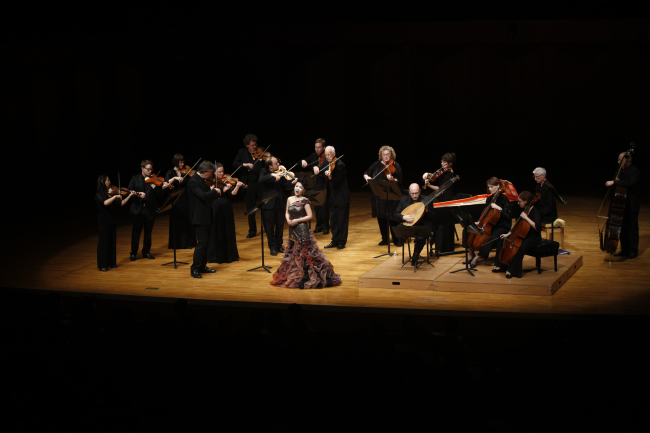Vivaldi’s “The Four Seasons” is one of the most familiar classical music pieces here ― it is the default ringback tone for mobile phone users and one of the most frequently suggested pieces for novices.
As such, it has lost freshness for many people due to its overexposure.
But in Tuesday’s Academy of Ancient Music’s concert, the Italian composer’s 292-year-old piece was reincarnated into a more classical yet somehow softer, vibrant, light-hearted and romantic serenade to the changing seasons.
The U.K.-based chamber orchestra, led by Pavlo Beznosiuk and using instruments from the time the piece was written, went back to the very roots of the music ― which pulled off a breath of fresh air for the audience.
 |
Soprano Im Sun-hae (center) and the Academy of Ancient Music. (Vincero) |
Starting with “Spring,” 13 members of the orchestra speeded up the beat over other musicians. Instead of “sharpening” the famous first six phrases, they liaised one note with another, which softened the overall tune and enabled the audiences to imagine the warm breeze of spring. The tenderness seemed to downplay the downpour, gales and thunder described in “Summer,” which was slightly disappointing. But the group regained its energy through “Autumn” and “Winter,” which was rather whimsical and warm.
In between each season the group invited celebrated soprano Im Sun-hae to sing arias by Handel and Purcell.
Im, famous for her sensational European debut with legendary conductor Philippe Herreweghe, delivered quintessential Baroque vocals.
In the blink of an eye she transformed from a heartbroken woman to a righteous one and then into a tragic protagonist with her signature transparent voice tone. She managed to raise and shift the tunes briskly, without hesitation or difficulties.
Im induced thunderous applause from the audience when she sang “Lascia ch’io Pianga,” the masterpiece aria by Handel, portraying a woman stuck in an unwanted courtship.
Outside the concert hall the rain fell, with people scurrying to escape the downpour. But inside, the air was filled with romance, warmth and comfort, an aura in which the Baroque-era upper class might have cherished the music.
By Bae Ji-sook (
baejisook@heraldcorp.com)




![[Herald Interview] 'Trump will use tariffs as first line of defense for American manufacturing'](http://res.heraldm.com/phpwas/restmb_idxmake.php?idx=644&simg=/content/image/2024/11/26/20241126050017_0.jpg)

![[Health and care] Getting cancer young: Why cancer isn’t just an older person’s battle](http://res.heraldm.com/phpwas/restmb_idxmake.php?idx=644&simg=/content/image/2024/11/26/20241126050043_0.jpg)

